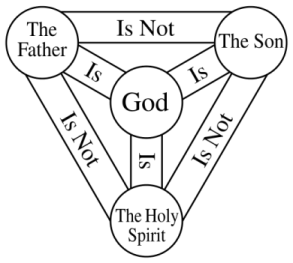Many, dare I say most, Christians do not truly know who God is.
While this may sound harsh, even blasphemous to most, it is the unfortunate truth. There has been a dire misconception amongst Christians that Jesus Christ is God, and that he is innately both “fully God” and “fully man.” This doctrine is confusing for most people to understand and is leading them further away from the truth. The reason this teaching is confusing is because it is not of God, but of Satan.
“For God is not the author of confusion, but of peace, as in all churches of the saints.”
(1 Corinthians 14:33)
Many doctrines attempt to make the Word of God more confusing than necessary. Jesus cannot serve as both God and the Son of God. We are made in the very image and likeness of the Father and the Son. Like a parent to a child, we model our very existence on this simple concept. If you are a parent, your primary focus—outside of having a personal and intimate relationship with both God and Jesus yourself—is to teach your children to obey God’s word (Proverbs 22:6). This is precisely the same principle God the Father has modeled with His own begotten Son, Jesus. Jesus even tells us that his Father is his God and our God:
“Jesus saith unto her, Touch me not; for I am not yet ascended to my Father: but go to my brethren, and say unto them, I ascend unto my Father, and your Father; and to my God, and your God.”
(John 20:17)
Jesus’ profession to Mary Magdalene tells us three things: 1) Jesus himself has a God, 2) Jesus’ God is also known as the Father, and 3) the same God and Father of Jesus is also our God and Father. Armed with this knowledge, it should be made clear that Jesus himself is not God in any fashion. However, it cannot be mistaken that Jesus is divine and has godliness that is beyond that of a mortal human. This begs the question: if Jesus is not God, how can he be divine?
Understanding the “Mystery” of Jesus the Son
Many Christian scholars propose that Jesus is God based on a handful of verses written in the Old and New Testament that serve as proposed “evidence” of characteristics that Jesus possesses which can only be attributed to God. Unfortunately, each of these verses are taken out of context and require a deep understanding that can only be revealed by the Holy Spirit (John 16:13, 1 Corinthians 2:10-14). It is impossible to read scripture without the Holy Spirit and understand the truth; on the other hand, it is very possible to read scripture and impose our own understandings to try and make sense of God’s word (Proverbs 3:5-6). Those who seek the righteousness of God will understand the difference between the Father and the Son.

The Trinity Shield
The Trinity is a doctrine that focuses on “one God, but three persons.” This is a perfect example of a “half-truth.” Yes, there is “one God,” but there are not “three persons” that are equally God. And this is best explained by understanding the divine nature that exhibits between the Father, and the Son, and the Holy Spirit. For the purpose of this article, we will focus on the divine nature of the Son, Jesus Christ.
The Trinity ascribes Jesus to be both “fully God” and “fully man,” which is yet another half-truth. Jesus was indeed fully man, but he has never been “fully God.” Jesus always claimed to be the Son of God—never as God Himself. The notion that Jesus is “God the Son” is not scriptural whatsoever. While there are plenty of verses that validate the Father as being God, there are no scriptures that validate Jesus being God outside of speculation or false interpretation. Here are only a handful of verses that, without question, confirm the Father as being God:
“Grace be with you, mercy, and peace, from God the Father, and from the Lord Jesus Christ, the Son of the Father, in truth and love.”
(2 John 1:3)
“Blessed be the God and Father of our Lord Jesus Christ, who hath blessed us with all spiritual blessings in heavenly places in Christ:”
(Ephesians 1:3)
“Blessed be the God and Father of our Lord Jesus Christ, which according to his abundant mercy hath begotten us again unto a lively hope by the resurrection of Jesus Christ from the dead,”
(1 Peter 1:3)
“Have we not all one father? hath not one God created us? why do we deal treacherously every man against his brother, by profaning the covenant of our fathers?”
(Malachi 2:10)
“One God and Father of all, who is above all, and through all, and in you all.”
(Ephesians 4:4-6)
Trinitarian doctrine proposes that Jesus is God, but that he is not the Father, who is also God. This doesn’t make scriptural sense, and the typical response is that “it is a mystery” and no one truly knows how this can be. Again, this is false—for it is written that the mysteries of the kingdom of God are to be revealed to us:
“And to make all men see what is the fellowship of the mystery, which from the beginning of the world hath been hid in God, who created all things by Jesus Christ:”
(Ephesians 2:9)
“And he said unto them, Unto you it is given to know the mystery of the kingdom of God: but unto them that are without, all these things are done in parables:
[12] That seeing they may see, and not perceive; and hearing they may hear, and not understand; lest at any time they should be converted, and their sins should be forgiven them.”
(Mark 4:11)
Only those who seek God’s righteousness will be given the answers. We are in the Father, but God created all things [meaning a way, a truth, and eternal life] by Jesus (1 Corinthians 8:6, John 14:6).
A Closer Look at Jesus’ Divine Nature
Jesus is the only begotten Son of God. The word “begotten,” according to the King James Version, means “to be born or brought forth.” Jesus is uniquely divine from any other heavenly entity because he was the only one brought forth from God the Father’s hands alone. After Jesus was brought forth from God’s eternal foreknowledge, wherein lies the wisdom and knowledge of God, he was given all power and authority in heaven and earth from the Father. God, the Father, gave His knowledge, wisdom, and power to His appointed heir Jesus Christ, who then created the heavens and the earth with that power. This fully explains the divinity of Jesus Christ; he came forth from eternity [God’s foreknowledge] and was given life from the Father. Using the power bestowed to him, Jesus made all things in heaven and earth by obeying the commandments from the Father.
There is nothing in heaven and earth more divine than Jesus Christ. He is the only being that was created by the hand of God Himself. This is why Jesus proclaims that “[his] Father is greater than I” and “greater than all” (John 14:28, John 10:29). In everything Jesus says and does, he glorifies the Father for giving him the power and authority he possesses—without the Father [without God], Jesus can do nothing:
“Then answered Jesus and said unto them, Verily, verily, I say unto you, The Son can do nothing of himself, but what he seeth the Father do: for what things soever he doeth, these also doeth the Son likewise.”
(John 5:19)
“I can of mine own self do nothing: as I hear, I judge: and my judgment is just; because I seek not mine own will, but the will of the Father which hath sent me.”
(John 5:30)
“Then said Jesus unto them, When ye have lifted up the Son of man, then shall ye know that I am he, and that I do nothing of myself; but as my Father hath taught me, I speak these things.”
(John 8:28)
Many doctrines attempt to say that Jesus’ divinity can only be achieved if he himself is God. However, this could not be further from the truth. According to these same doctrines, Jesus himself is “fully man” and “fully God,” but this is an overstated contradiction that severely limits the power of God. If God has ordained Jesus to be His image [representation], and Jesus possesses the power and authority of God because it was given to him, then it is indisputable to say that Jesus does not need to be God in order to speak and act on His behalf. With man, this is impossible, but with God all things are possible (Matthew 19:26). God will not tolerate sin in His presence. Jesus is the closest one to the Father than any other being; thus it was most appropriate that God [the Father] would send His only begotten Son to teach us about Him.
“In that hour Jesus rejoiced in spirit, and said, ‘I thank thee, O Father, Lord of heaven and earth, that thou hast hid these things from the wise and prudent, and hast revealed them unto babes: even so, Father; for so it seemed good in thy sight.
[22] All things are delivered to me of my Father: and no man knoweth who the Son is, but the Father; and who the Father is, but the Son, and he to whom the Son will reveal him.”(Luke 10:21-22)
Unfortunately, this is why many Christians will go to hell—because they do not recognize that it is the Father who is the one true God, just as Jesus has told us since the beginning (Hosea 4:6). Instead, they believe the flagrant lies of public authority figures and old doctrines that were written to confuse the mind into adopting a covenant that is against God. Jesus has concretely told us who God is himself:
“And this is life eternal, that they might know thee [the Father] the only true God, and Jesus Christ, whom thou hast sent.”
(John 17:3)
Those who preach the Trinity as truth because it has been “established” as true doctrine by man of past traditions have not received these confirmations from the Holy Spirit. It is no different than the blind leading the blind, and it is them who deny the Father’s almighty power and idolize the Son and the Holy Spirit as God instead of the Father.
“Let them alone: they be blind leaders of the blind. And if the blind lead the blind, both shall fall into the ditch.”
(Matthew 15:14)
Many arguments in opposition of the Trinitarian doctrine have been shown through scripture to prove that Jesus’ divinity is derived from the Father’s power and spirit and not his own:
- Jesus himself claims that he does not know the time or hour of the second coming (Mark 13:32, Matthew 24.36).
- Jesus prays to the Father for thanks and guidance on all things before he speaks or acts on the Father’s behalf (Matthew 6:9-13; John 11:41-42; John 12:27-28; Luke 23:34, 46).
- Jesus is the firstborn from the dead, meaning he is the first to be given eternal life from the Father (Colossians 1:18, John 5:26).
- Jesus is the mediator between God [the Father] and man, and he is the only way, truth, and life that leads to the Father (1 Timothy 2:5, John 14:6).
- God the Father raised Jesus from the dead (Romans 8:11; Romans 10:9; Acts 13:30; Galatians 1:1).
- Jesus claims that he is not “good,” and that there is only one who is good—God (Matthew 19:17, Mark 10:18).
- Jesus professes that he has come to do the doctrine of his Father (John 7:17).
- Peter attests that God performed all manners of miracles through Jesus (Acts 2:22).
If God is always omnipotent, omniscient, and omnipresent, then it is impossible to say that Jesus himself is God if he does not know the time of his own coming, receives the commandments from his God and Father, does nothing on his own behalf, and claims the doctrine is not his but the Father’s.
Be not deceived…
Jesus is not and does not need to be God in order to have divinity. God has appointed His only begotten Son to be the propitiation of the sins of the entire world, as he was the sinless Messiah of prophecy. God’s will was manifested in the flesh through the life, death, and resurrection of Jesus Christ. Jesus Christ was God’s image and representative, whose purpose was to fulfill the Father’s [God’s] will.
Once we understand this truth, God will give His wisdom and knowledge in abundance, and the mysteries of godliness will be revealed to us. Thus, we will become one, even as they are one (John 17:21-23).
Amen.



